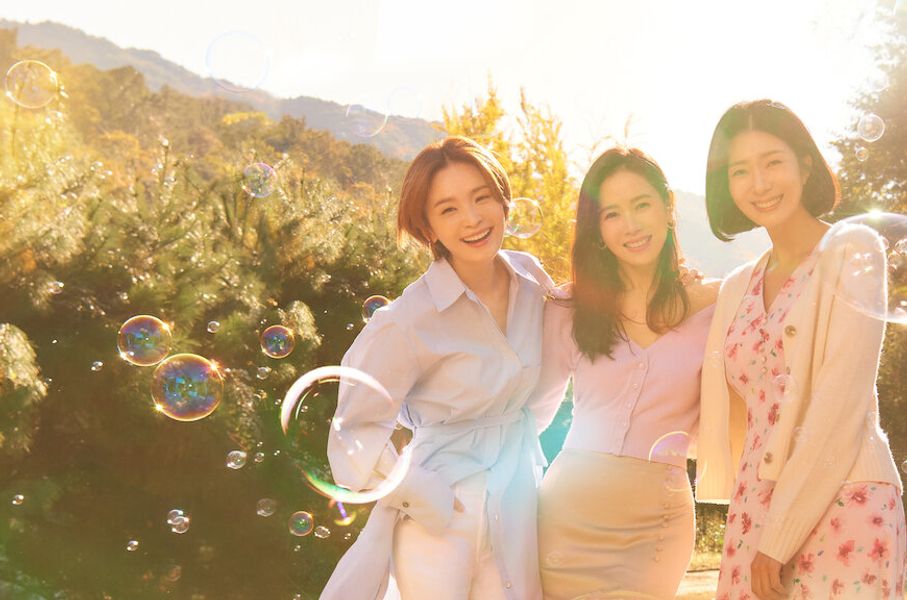For quite some time K-Dramas have been typecast into typical sappy love stories with relationship triangles, misunderstandings, jealousy, pining, heartbreaks and eventual happy endings at the centre of almost every narrative. With the exception of series like Squid Game, Kingdom, Vincenzo, My Name, All of Us Are Dead etc., most Netflix K-Dramas have resorted to the safety net of romantic narratives. However, Kim Sang-ho’s 2022 South Korean series, Thirty-Nine infuses romance and friendship within the poignant realities of life and has a bittersweet ending that gets one thinking.
If you are a fan of female friendships and have loved Sex and the City or FRIENDS for the camaraderie among the characters, then you will adore this drama. While Thirty-Nine does not have the grandeur of New York City fashion from Sarah Jessica Parker’s Sex and the City nor the long-drawn ten-season run of the popular English TV Show, it is a brilliant representation of female friendships on the brink of turning 40. Since time immemorial, the age of women has been a central issue in films and series.
Turning thirty has always been considered to be a major milestone and the forties are usually considered to be the moment a mid-life crisis kicks in. Women are said to age much faster than men and nobody could have said it better than Emma Watson who, just before her 30th birthday, said, “I was like, ‘Why does everyone make such a big fuss about turning 30? This is not a big deal.’ Cut to 29, and I’m like, ‘Oh my God, I feel so stressed and anxious.’ And I realise it’s because there is suddenly this bloody influx of subliminal messaging around.”
Watson could not have spoken truer words. And that is the exact sentiment that has been a major part of K-Dramas also, usually focusing on younger women who fit certain beauty standards. However, with Thirty-Nine, the focus shifts from the usual teenagers and young adults to women who are waiting to turn forty. Single, jaded yet partnered with one another, the trio, namely Chan-young, Mi-jo and Joo-hee are first introduced in the series. Adorable and extremely intriguing, the women have somewhat stable jobs, invest in things they like and have a pretty strong friendship that began on the unlikeliest grounds. Mi-jo, who had been adopted at a young age and is in constant pursuit of her birth mother’s identity despite having a loving adoptive family, often hosts picnics at the orphanage where her friends tag along.
Amidst flashbacks to their youth that involved failed nightclub entries, familiar restaurants and a lot of soju, the three grow up with individual problems that they are still trying to find solutions to. However, their singlehood is never equated with loneliness, they somehow manage to build a home with one another. Cometh the second episode, Mi-jo discovers that her dear friend Chan-young is terminally ill and has slim chances of survival. Thus the trio embark on an odyssey to fulfil Chan-young’s bucket list while trying to find problems to their own solutions.
Unlike other K-Dramas, this 12-episode show deals with heavyweight issues. This involves infidelity, terminal illness, consequences of wistful adoption, abandonment, alcoholism, self-destructive tendencies etc. In a groundbreaking manner, the show does not have any morally black or white characters. They are all ambiguous in nature due to their flaws and follies. Even with cancer, Chan-young does not demand sympathy from the audience, making her departure even more heartwrenching and brutal.
The trio live up to their dreams, they find love, they laugh together and they manage to find a solution to their problems. Well, most. With Chan-young’s departure, the show does not hide the brutal realities of life. The sorrow and grief that her friends feel are not masked, Mi-jo still calls her number hoping to hear her voice once. The art of moving on is never explicitly shown because at thirty-nine, can someone really move on? The show subverts the stereotypes regarding age and almost hints at how life nearly begins at thirty-nine and how the new decade holds endless possibilities for an individual, helping defeat the worries that come with age.
If you are a fan of Japanese filmmaker Ryusuke Hamaguchi’s five-hour slow-burn 2015 odyssey Happy Hour that featured women at the centre, you will enjoy this less poignant yet worthy and heartwarming Korean successor in Thirty-Nine.
Watch Thirty-Nine on Netflix now.
